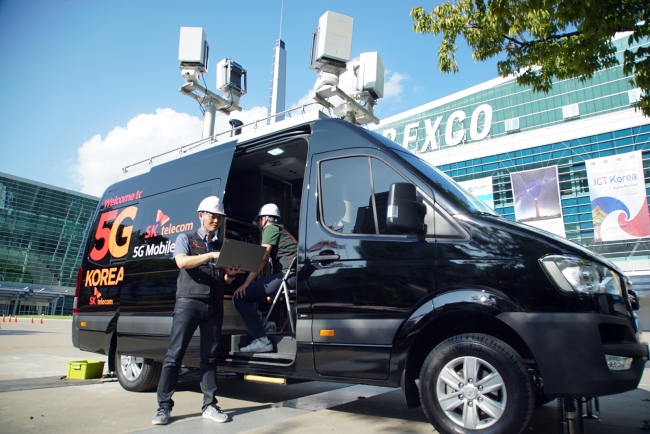SK Telecom seeks to secure global lead in 5G network tech
By Sohn Ji-youngPublished : Sept. 26, 2017 - 15:08
South Korea’s SK Telecom is seeking to become a global leader in 5G network technologies by preparing to become the first industry player to commercialize the ultrafast network by 2019.
SKT recently topped the list of “most promising” 5G network operators worldwide by UK-based market research firm Juniper Research for its forward trialing of 5G-enabling core technologies including millimeter waves, multiple-input multiple-output, or MIMO, transmission as well as network splicing.
The Korean telecom company ranked above Japan-based NTT Docomo, Korean rival KT, China Mobile and US-based AT&T Mobility on Juniper Research’s list.
SKT recently topped the list of “most promising” 5G network operators worldwide by UK-based market research firm Juniper Research for its forward trialing of 5G-enabling core technologies including millimeter waves, multiple-input multiple-output, or MIMO, transmission as well as network splicing.
The Korean telecom company ranked above Japan-based NTT Docomo, Korean rival KT, China Mobile and US-based AT&T Mobility on Juniper Research’s list.

Short for fifth generation, 5G is an ultrafast wireless network system offering around 20 times faster transmission speeds than the existing fourth-generation or Long Term Evolution networks.
This superfast network promises extremely low latency -- delays caused when transmitting large amounts of data. Such speed is considered integral to the operation of futuristic technologies, such as autonomous vehicles, the Internet of Things and virtual reality.
Mobile carriers around the world including Korea’s SKT have been working with telecom equipment makers to develop and fine-tune an array of new network technologies integral to 5G, with aims to commercially deploy the ultrafast network by 2019.
Last year, SKT successfully demonstrated a pilot 5G system using millimeter waves in the ultrahigh 28 gigahertz spectrum, achieving a transmission speed of more than 20 gigabits per second with latency below 1 milliseconds.
The 5G pilot system was deployed for SKT’s experimental connected vehicle T5, which demonstrated the vehicle’s consistent, uninterrupted 5G connection to elements on the road like stoplights and other nearby cars.
In March this year, SKT ran another large-scale 5G pilot network based on the 38 GHz band at a baseball stadium in Incheon, showcasing a number of 5G-dependent network services for a large crowd of around 20,000 visitors.
In June, SKT in partnership with Samsung Electronics succeeded in operating a 5G pilot network based on the 3.5 GHz spectrum. It achieved speeds of over 1 Gbps and low latency of 1.2 milliseconds.
Though the ultrahigh 28GHz frequencies are good at quickly transmitting large volumes of data like high-definition videos, its range is relatively narrow and the waves often do not travel well through obstacles.
Meanwhile, the ultralow 3.5GHz frequencies enable wider and more stable coverage, making it suitable for applications requiring wider area network coverage like autonomous cars.
SKT and Samsung plan to “continue their joint efforts to create unprecedented services that are optimized to the distinct traits of 28 GHz and 3.5GHz frequencies, as well as next generation network architecture,” they said.
In addition to Samsung, SKT is pushing its 5G development efforts with other global telecom equipment companies including Nokia and Ericsson. It also began officially recruiting new partner companies to co-develop new 5G services and core technologies in Korea in April.
The 5G market is expected to grow to $1.23 trillion by 2026, according to a report by Ericsson announced at the Mobile World Congress earlier this year.
Market research firm IHS Markit predicts the global 5G value chain will generate $3.5 trillion in output and support 22 million jobs in 2035, which is larger than the value of today’s entire mobile value chain.
By Sohn Ji-young (jys@heraldcorp.com)









![[Kim Seong-kon] Democracy and the future of South Korea](http://res.heraldm.com/phpwas/restmb_idxmake.php?idx=644&simg=/content/image/2024/04/16/20240416050802_0.jpg&u=)







![[KH Explains] Hyundai's full hybrid edge to pay off amid slow transition to pure EVs](http://res.heraldm.com/phpwas/restmb_idxmake.php?idx=652&simg=/content/image/2024/04/18/20240418050645_0.jpg&u=20240418181020)

![[Today’s K-pop] Zico drops snippet of collaboration with Jennie](http://res.heraldm.com/phpwas/restmb_idxmake.php?idx=642&simg=/content/image/2024/04/18/20240418050702_0.jpg&u=)